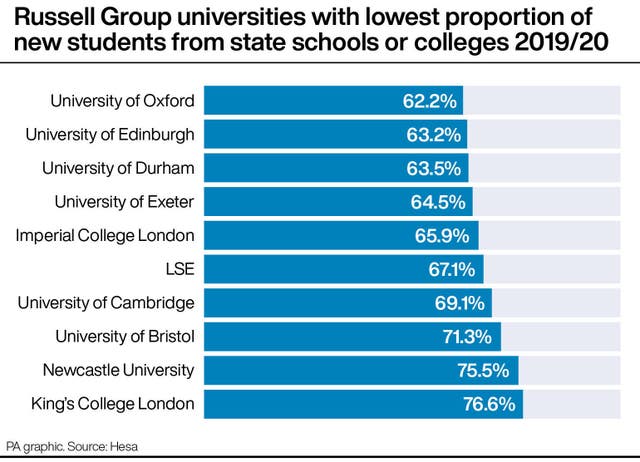The proportion of students from state schools entering UK universities has remained almost unchanged for the past five years, despite a continuing push to boost numbers.
More than two in five of the UK’s top institutions saw a fall in the number of students from the state sector starting courses in 2019/20, figures suggest.
Of young people starting university in 2019/20, nine in 10 (90.1%) were educated at state schools – a slight rise of 0.1 percentage points on the previous year.
But the official data, published by the Higher Education Statistics Agency (Hesa), shows that the proportion of state-educated students differs significantly by university or college.

At some institutions, fewer than a third of UK students who started full-time undergraduate courses in the autumn of 2019 were from state schools, while at other providers all students were state-educated.
An analysis of the figures by the PA news agency shows that the proportion of state school students is less than 75% in 23 universities and specialist colleges.
Of this list, nine are Russell Group universities – which are traditionally the most selective institutions in the UK.
Out of the 24 Russell Group institutions, 10 (41.7%) saw a fall in UK state-educated entrants between 2018/19 and 2019/20, the analysis shows.
Edinburgh, Durham and Exeter were among the universities with the lowest proportions of state school pupils – 63.2%, 63.5% and 64.5% respectively – and their figures fell on the previous year.
The statistics comes as universities in the UK are under increasing pressure from ministers and the regulator to widen access to higher education.
Geoff Barton, general secretary of the Association of the School and College Leaders (ASCL), said: “It simply isn’t acceptable that the proportion of state school pupils at some universities is so low.
“We are aware that the higher education sector has done a great deal of work in endeavouring to widen participation but there is clearly a long way to go in certain institutions.
“We understand that taking context into account in applications is a complex business, but frankly, this problem has gone on for too long and more action is needed.”
In 2019/20, of all young UK university entrants starting their first, full-time undergraduate degree, 11.8% were from “low participation neighbourhoods” – the places with the fewest youngsters going into higher education.
This is up 0.4 percentage points from 11.4% in 2018/19.
Chris Millward, director for fair access and participation at the Office for Students (OfS), said: “These figures, which largely account for students starting courses before the pandemic, show a continued and steady increase in the representation of people from the most disadvantaged neighbourhoods among those in higher education.
“This means that more students from areas where higher education participation is low – often formerly industrial towns and parts of cities in the North and Midlands, and coastal towns – are seizing the opportunities that higher education can bring.
“Some of the most substantial increases are at the most selective universities, where participation from students from disadvantaged backgrounds has traditionally been low. This is welcome, but there is more to do.”
He added: “We will be working closely with universities and colleges to ensure that the significant progress to date is not stalled by the pandemic.”
A Russell Group spokesman said: “The proportion of students entering from state schools and from low participation neighbourhoods increased slightly across the Russell Group as a whole in 2019/20.
“Our members are working hard to increase that number further, and undertake a wide range of school outreach activities, including mentoring schemes, summer schools and campus visits.”
He added: “Last summer the ratio between students from the highest and lowest participation areas taking up a place at Russell Group universities in England for 2020/21 improved and there was a 22% rise in students placed from the most underrepresented areas.
“This reflects our members’ determination to ensure students were not disadvantaged by assessment changes in 2020 and we will continue to take a fair and flexible approach this summer.”




Comments: Our rules
We want our comments to be a lively and valuable part of our community - a place where readers can debate and engage with the most important local issues. The ability to comment on our stories is a privilege, not a right, however, and that privilege may be withdrawn if it is abused or misused.
Please report any comments that break our rules.
Read the rules here